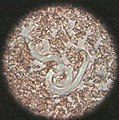Spirurida
Spirurida is an order of parasitic nematodes. It includes many species which are parasitic in the gut of vertebrates, and some which are parasitic in invertebrates. The order is divided into two suborders, the Spirurina and the Filariata. The former includes species which are parasitic in the gut of vertebrates, and the latter includes species which are parasitic in the blood and tissues of vertebrates.
Taxonomy[edit]
The order Spirurida is divided into two suborders, the Spirurina and the Filariata. The Spirurina includes species which are parasitic in the gut of vertebrates, and the Filariata includes species which are parasitic in the blood and tissues of vertebrates.
Life cycle[edit]
The life cycle of Spirurida nematodes typically involves an intermediate host, which is usually an invertebrate. The nematode eggs are ingested by the intermediate host, where they hatch and develop into larvae. The larvae are then ingested by the definitive host, where they mature and reproduce.
Pathogenicity[edit]
Some species of Spirurida are pathogenic to their hosts. They can cause a variety of diseases, including lymphatic filariasis, onchocerciasis, and loiasis. These diseases are typically caused by the adult worms living in the tissues of the host, where they can cause inflammation and damage.
Treatment[edit]
Treatment for infections caused by Spirurida nematodes typically involves the use of anthelmintic drugs, such as ivermectin and albendazole. These drugs work by killing the adult worms and preventing them from reproducing.
See also[edit]
Ad. Transform your life with W8MD's Budget GLP-1 injections from $75


W8MD offers a medical weight loss program to lose weight in Philadelphia. Our physician-supervised medical weight loss provides:
- Weight loss injections in NYC (generic and brand names):
- Zepbound / Mounjaro, Wegovy / Ozempic, Saxenda
- Most insurances accepted or discounted self-pay rates. We will obtain insurance prior authorizations if needed.
- Generic GLP1 weight loss injections from $75 for the starting dose.
- Also offer prescription weight loss medications including Phentermine, Qsymia, Diethylpropion, Contrave etc.
NYC weight loss doctor appointmentsNYC weight loss doctor appointments
Start your NYC weight loss journey today at our NYC medical weight loss and Philadelphia medical weight loss clinics.
- Call 718-946-5500 to lose weight in NYC or for medical weight loss in Philadelphia 215-676-2334.
- Tags:NYC medical weight loss, Philadelphia lose weight Zepbound NYC, Budget GLP1 weight loss injections, Wegovy Philadelphia, Wegovy NYC, Philadelphia medical weight loss, Brookly weight loss and Wegovy NYC
|
WikiMD's Wellness Encyclopedia |
| Let Food Be Thy Medicine Medicine Thy Food - Hippocrates |
Medical Disclaimer: WikiMD is not a substitute for professional medical advice. The information on WikiMD is provided as an information resource only, may be incorrect, outdated or misleading, and is not to be used or relied on for any diagnostic or treatment purposes. Please consult your health care provider before making any healthcare decisions or for guidance about a specific medical condition. WikiMD expressly disclaims responsibility, and shall have no liability, for any damages, loss, injury, or liability whatsoever suffered as a result of your reliance on the information contained in this site. By visiting this site you agree to the foregoing terms and conditions, which may from time to time be changed or supplemented by WikiMD. If you do not agree to the foregoing terms and conditions, you should not enter or use this site. See full disclaimer.
Credits:Most images are courtesy of Wikimedia commons, and templates, categories Wikipedia, licensed under CC BY SA or similar.
Translate this page: - East Asian
中文,
日本,
한국어,
South Asian
हिन्दी,
தமிழ்,
తెలుగు,
Urdu,
ಕನ್ನಡ,
Southeast Asian
Indonesian,
Vietnamese,
Thai,
မြန်မာဘာသာ,
বাংলা
European
español,
Deutsch,
français,
Greek,
português do Brasil,
polski,
română,
русский,
Nederlands,
norsk,
svenska,
suomi,
Italian
Middle Eastern & African
عربى,
Turkish,
Persian,
Hebrew,
Afrikaans,
isiZulu,
Kiswahili,
Other
Bulgarian,
Hungarian,
Czech,
Swedish,
മലയാളം,
मराठी,
ਪੰਜਾਬੀ,
ગુજરાતી,
Portuguese,
Ukrainian




